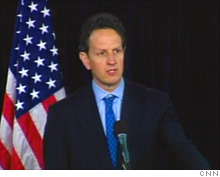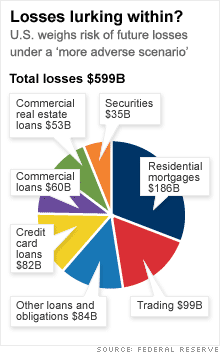Banks' new stress reliever
With stress tests soon to be in the rearview mirror, banks that need more capital may find themselves peddling assets to Treasury's public-private funds.
 |
| Regulators led by Tim Geithner want banks to sell assets so they can keep lending, observers say. |

NEW YORK (Fortune) -- Don't like your stress test results? The government may have just the tonic: the public-private investment partnerships that aim to relieve lenders of troubled assets.
The nation's biggest financial institutions got their marching orders from federal regulators Thursday. Some big banks, such as lender JPMorgan Chase (JPM, Fortune 500) and investment bank Goldman Sachs (GS, Fortune 500), aced the tests and don't have to raise new funds.
But policymakers told other big banks to raise capital in the next six months to ensure they can keep lending should the economic downturn persist through next year. The decision makes those firms -- ranging from giants Citigroup (C, Fortune 500) and Bank of America (BAC, Fortune 500) to regional banks such as KeyCorp (KEY, Fortune 500) -- prime candidates to sell assets.
Some banks will surely do so in private transactions. Wells Fargo (WFC, Fortune 500), for example, announced Thursday afternoon that it was proposing to sell $6 billion in common stock. Morgan Stanley followed suit with plans to sell $2 billion in stock and $3 billion in senior notes.
But others may find themselves making use of the Treasury Department's Public-Private Investment Program (PPIP), which was rolled out alongside the stress tests in February. Investors are expecting to learn more details about the plans over the next month.
"What's important about [the stress] tests is that people have essentially been authorized to rightsize their businesses," said John Koelmel, CEO of First Niagara Financial in Lockport, N.Y. "Banks that have to raise capital aren't going to want to go to the capital markets as a first option. They're going to want to strengthen their story first."
Koelmel, whose bank agreed last month to acquire 57 Pennsylvania from stress test bank PNC, has been making this case for some time. He said many of the biggest banks have gotten too big, and the regulators are now using the stress tests to give them cover to sell off some assets and otherwise trim down without appearing weak to the market.
So far this year, the 19 stress test banks have done relatively few deals of note. Aside from the PNC branch sale, regional bank Fifth Third (FITB, Fortune 500) agreed to sell a payment processing joint venture.
But Koelmel said he believes the release of stress test results will lead to a more vigorous market for asset sales.
And while some observers have criticized the terms of the stress tests as insufficiently stressful, Koelmel said he believes policymakers have made it clear to banks that they will be imposing more stringent capital guidelines going forward. The knowledge that the bar is being raised gives banks another incentive to sell assets and bulk up their buffer against further economic deterioration, he said.
"The screws are going to get progressively tighter," Koelmel said of the capital standards being set by the Federal Reserve, FDIC and Office of the Comptroller of the Currency. "We're well above the standards they put in the tests, and our regulators have been in our face already. So you can see where they're going to go with this."
The PPIP -- which comprises a program run by the Federal Deposit Insurance Corp. to dispose of troubled bank loans and a program run by Treasury to rid banks of hard-to-sell securities -- got a boost last week, when vulture investor Wilbur Ross said he might invest as much as $1 billion in existing funds in the programs.
"We strongly believe that the Public-Private Investment Program will help stimulate the mortgage market and provide individual and institutional investors globally with compelling investment opportunities," Ross' investing partner, Atlanta-based Invesco, said in a statement.
Ross is far from alone. Treasury said April 29 it had received more than 100 applications from potential fund managers interested in the Legacy Securities program.
Still, one question that remains unresolved is how the legacy loans and securities programs will be structured for investors.
The PPIP plans have been on the drawing board for almost three months, but regulators have often changed rules on the fly in handling other financial programs. So some would-be participants are getting antsy.
"The anticipation is unbelievable," said Hal Reichwald, a partner at Los Angeles law firm Manatt Phelps & Phillips. "The big players are telling the regulators they don't want to see any heavy-handed intervention, but they really just want to get going."
Reichwald said regulators have been slow to make the rules of the program clear to possible participants. The delay hasn't gotten much notice amid the recovery talk and bank-stock rally of the past two months.
But that could all change if the commercial real estate market -- long a source of anxiety for investors in banks and other property-related firms -- is hit by a big default.
"There's been a sense of inevitability about things getting better over time," Reichwald said. But he added that "there's no guarantee" that big commercial real estate borrowers will be able to keep current on their mortgages. ![]()
-
 The retail giant tops the Fortune 500 for the second year in a row. Who else made the list? More
The retail giant tops the Fortune 500 for the second year in a row. Who else made the list? More -
 This group of companies is all about social networking to connect with their customers. More
This group of companies is all about social networking to connect with their customers. More -
 The fight over the cholesterol medication is keeping a generic version from hitting the market. More
The fight over the cholesterol medication is keeping a generic version from hitting the market. More -
 Bin Laden may be dead, but the terrorist group he led doesn't need his money. More
Bin Laden may be dead, but the terrorist group he led doesn't need his money. More -
 U.S. real estate might be a mess, but in other parts of the world, home prices are jumping. More
U.S. real estate might be a mess, but in other parts of the world, home prices are jumping. More -
 Libya's output is a fraction of global production, but it's crucial to the nation's economy. More
Libya's output is a fraction of global production, but it's crucial to the nation's economy. More -
 Once rates start to rise, things could get ugly fast for our neighbors to the north. More
Once rates start to rise, things could get ugly fast for our neighbors to the north. More








